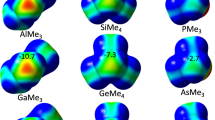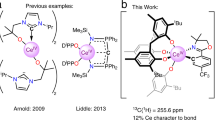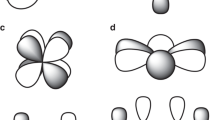Abstract
ONE of the conclusions of a preceding paper1 was that the dissociation energy of the metal–carbon bonds decreases with the increasing mass number of the metal atom in the series (Alkyl)4C, (Alkyl)4Si, (Alkyl)4Ge, (Alkyl)4Sn and (Alkyl)4Pb, where Alkyl is CH3 or C2H5. This we attributed to the increasing bond polarizabilities. According to Lampe et al.2, there is a linear relationship between the polarizability and the total ionization cross-section. This relationship can be rationalized theoretically as follows.
This is a preview of subscription content, access via your institution
Access options
Subscribe to this journal
Receive 51 print issues and online access
$199.00 per year
only $3.90 per issue
Buy this article
- Purchase on Springer Link
- Instant access to full article PDF
Prices may be subject to local taxes which are calculated during checkout
Similar content being viewed by others
References
de Ridder, J. J., and Dijkstra, G., Rec. Trav. Chim., 86, 737 (1967).
Lampe, F. W., Franklin, J. L., and Field, F. H., J. Amer. Chem. Soc., 79, 6129 (1957).
Slater, J. C., in Quantum Theory of Matter, 388 (McGraw-Hill, New York, 1951).
Mott, N. F., and Massey, H. S. W., in The Theory of Atomic Collisions, 247 (Oxford Univ. Press, London, 1949).
Author information
Authors and Affiliations
Rights and permissions
About this article
Cite this article
DE RIDDER, J., DIJKSTRA, G. Total lonization Cross-section of some Tetra Alkyl Metal Compounds. Nature 216, 260–261 (1967). https://doi.org/10.1038/216260a0
Received:
Issue Date:
DOI: https://doi.org/10.1038/216260a0
Comments
By submitting a comment you agree to abide by our Terms and Community Guidelines. If you find something abusive or that does not comply with our terms or guidelines please flag it as inappropriate.



